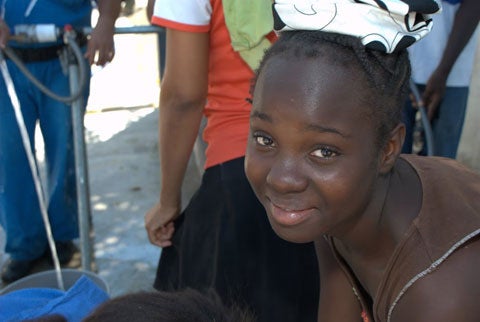

Representatives of member organizations of the Regional Coalition for Water and Sanitation to Eliminate Cholera in Hispaniola met today at the Pan American Health Organization/World Health Organization (PAHO/WHO) to assess progress that has been made in controlling cholera in Haiti and the Dominican Republic, and to discuss additional resources that will be needed to eventually eliminate the disease island-wide.
Members of the Regional Coalition seek better coordination, more resource mobilization to advance cholera elimination island-wide
Washington, D.C., 4 February 2014 (PAHO/WHO) ? Representatives of member organizations of the Regional Coalition for Water and Sanitation to Eliminate Cholera in Hispaniola met today at the Pan American Health Organization/World Health Organization (PAHO/WHO) to assess progress that has been made in controlling cholera in Haiti and the Dominican Republic, and to discuss additional resources that will be needed to eventually eliminate the disease island-wide.
{slideshow}224,478,318,n{/slideshow}
"Today, after more than 8,000 people have died from cholera in Haiti, we want to reflect on how to mobilize the much-needed financial resources to support the ministries of health and water departments of Haiti and the Dominican Republic," PAHO/WHO Deputy Director Jon K. Andrus told meeting participants. "Haiti is making real progress in its fight against cholera. The number of cases is decreasing, and the dynamics of the epidemic are changing. But we know that, three years into the epidemic, many challenges remain."
Haiti's Director General of health, Marie Guirlaine Raymond Charité, participated in the meeting, which brought together representatives of nearly two dozen organizations that are members of the Regional Coalition.
Raymond noted that, since 2010, cholera has sickened nearly 700,000 people in Haiti and has claimed some 8,540 lives. As of January 2014, the disease continues to sicken more than 1,000 people and claim some 13 lives per month.
"Although the fatality rate has decreased, it is still a deadly epidemic," she said.
Richard Gelting, top water and sanitation expert at CDC's National Center for Environmental Health, noted that Haiti, with support from Coalition partners, has successfully carried out a pilot cholera vaccination campaign, and the national water and sanitation authority, DINEPA, has completed an inventory of water and sanitation infrastructure that provides a baseline for targeted improvements. A remaining challenge is to link information on the status of water and sanitation infrastructure with outbreak data from the cholera surveillance system.
Sang Silano, donor relations specialist with the United Nations' Office of the Secretary General's Coordinator for Cholera Response in Haiti, said the U.N System is supporting a two-track approach to cholera, including short-term interventions for immediate control and treatment of cholera coupled with longer-term investments in water and sanitation.
To ensure a coordinated response, the Government of Haiti and the U.N. are seeking to create a high-level coordinating committee based in Haiti and consisting of Haitian ministers of government, representatives of U.N. agencies active in Haiti, and other partners and donors. A special U.N. steering committee based in New York will ensure "that cholera remains a priority on the agenda for all U.N. agencies," Silano said.
Other participants noted the importance of involving other organizations that are active in Haiti, particularly nongovernmental organizations, in cholera elimination efforts and of supporting elimination efforts in both Haiti and the Dominican Republic.
"It is clear that our Coalition partners wish to maintain their focus on Hispaniola as a whole," said PAHO/WHO Deputy Director Andrus. "This means supporting interventions to close the gaps in water and sanitation for vulnerable communities on the border and in rural and peri-urban zones, strengthening surveillance and control of water quality, and exploring the possible deployment of oral cholera vaccine in mobile populations in border areas of both countries."
About the Regional Coalition
The Regional Coalition for Water and Sanitation to Eliminate Cholera in Hispaniola was established in 2012 by PAHO/WHO, UNICEF, the U.S. Centers for Disease Control and Prevention (CDC) and other partners. The Coalition has supported the governments of Haiti and the Dominican Republic in developing national cholera elimination plans and is currently working to mobilize resources for the plans' implementation. PAHO/WHO serves as the Coalition's secretariat. For more information and a list of Coalition member organizations, visit this link.
About PAHO
PAHO, founded in 1902, is the oldest international public health organization in the world. It works with its member countries to improve the health and the quality of life of the people of the Americas. It also serves as the Regional Office for the Americas of WHO.
Links



